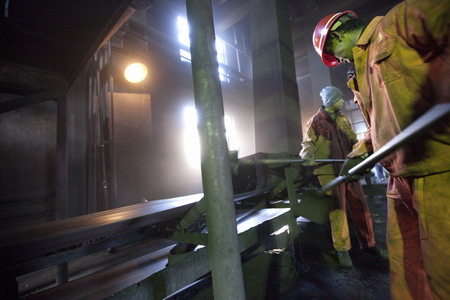Energy
Restructuring plan for the Inner Mongolian coal industry
By Du Juan (China Daily)
Updated: 2011-03-29 10:09
 |
Large Medium Small |
Workers refine coal at a coal washing facility in Shanxi province. Following the success of Shanxi province in restructuring its coal industry, Henan, Shandong and Guizhou provinces are also expected to take steps to consolidate and increase efficiency. [Photo / Bloomberg]
Region will reduce the number of firms to 100 in the next three years

BEIJING - The Inner Mongolia autonomous region will form more than 20 large-scale coal companies by the end of 2013, each with a production capacity of more than 10 million tons through restructuring, according to the local government's development plan for the industry.
The plan is to reduce the number of coal companies in the autonomous region to fewer than 100 from 353 in the next three years through mergers or restructuring, and the future big players are seen having annual profit of more than 10 billion yuan ($1.5 billion).
Experts said the restructuring will benefit the regional coal industry because the companies will receive more resources to increase production and strengthen their competitiveness. The process will also be helpful to the country's efforts in controlling growth in coal production in the 12th Five-Year Plan (2011-2015) period.
"The restructuring will be a long-term trend in the coal industry, and all outdated production capacity will gradually be eliminated," said Dai Bing, an analyst at coal.com.cn.
The Inner Mongolia government also said one or two giant coal companies, each with more than 100 million tons of production capacity, will established and smaller companies with fewer than 1.2 million tons of annual production capacity will be gradually eliminated.
Coal output may be affected during the restructuring period and prices are likely to rise for users in other provinces, Dai said.
Many small steel companies may be affected because of the reduction in supplies, said Zhang Lin, a senior analyst from Beijing Lange Steel Information Research Center.
"The big steel companies won't be affected much, but the smaller operators in the nearby provinces such as Hebei will have less choice when they buy coal because they don't have a stable relationship with large coal companies," she said.
However, in the long run the consolidation will help the companies to upgrade their technology and management. Also, the coal price will be more stable, thus helping downstream users, including power and steel companies.
According to the National Energy Administration, China plans to form 10 large-scale companies each with 100 million tons of production capacity in the next five years and production is expected to account for 90 percent of the country's total output.
| 分享按钮 |



